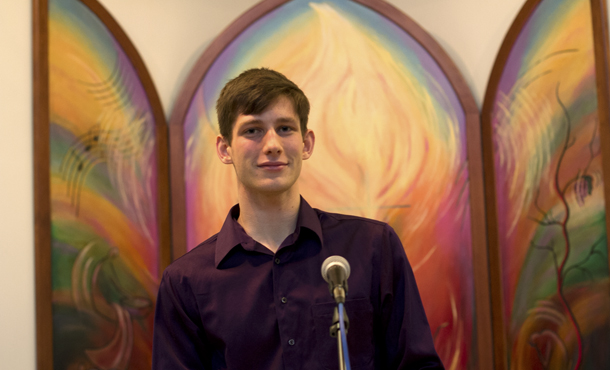In a 2014 bi-national peace oratorical contest, Eastern Mennonite University student Seth Stauffer won second place in a speech that questioned one of the policies of the contest’s sponsor, Mennonite Central Committee.
The policy has to do with how people working with MCC talk about their host countries when they go overseas. They are to refrain from comments that would offend or jeopardize their local partners and hurt the dignity of the people. MCC also urges its workers to respect the local culture and to refuse to reinforce stereotypes.
“I agree with the intent of the policy,” said Stauffer, a peacebuilding and development major from Lebanon, Pennsylvania, “but sometimes I think MCC goes too far.”
For two months during the summer of 2013, Stauffer was an intern with MCC in Honduras, which has the highest murder rate in the world. The American media portrays it as a violent country of drug traffickers that sends its children fleeing to the United States.
In Honduras, Stauffer wrote in his blog about the different ways he had noticed violence in that country. He mentioned the dilapidated housing in Honduras, writing that “poverty like this is not unrelated to violent crime.” He also wrote about his direct experiences with violence in the country.
Before posting his blog, Stauffer had MCC staff in Honduras review it. They asked him to remove the references to the houses and the violence. “I understood about the housing because it violated dignity. But I didn’t like that they wanted to censor what I said about violence, because I was trying to relate my experiences with violence in order to break down the dominant narrative of violence,” he said.
A few months later, back on campus, Stauffer signed up for the annual C. Henry Smith Oratorical Contest for students at Mennonite colleges in the United States and Canada. The student was to apply the Christian peace position to a contemporary concern in 1,500 words or less, speaking for 8-10 minutes.
Stauffer decided to write and speak about the dangers of avoiding difficult discussions about violence, inspired by his experience in Honduras. He also drew on a TED talk that has been reference frequently by MCC workers. It was by Chimamanda Ngozi Adichie on “The Danger of a Single Story” in which she decried the dominant cultural narratives.
In Honduras, MCC wanted to fight the dominant narrative that the country was a violent place. “But in this case, where I couldn’t even talk about violence, MCC had similarly adopted a single story to compensate against the dominant narrative,” Stauffer said.
Stauffer’s speech, titled “The Danger of MCC’s Own Single Story,” won first place at EMU last March. He received $250. The two runners up for EMU were senior writing studies major Chris Yoder and senior biblical studies major Jordan Luther. The other contestants were first-year student Sara Caitlin Neubert and junior Chris Parks.
“I am grateful for students like Seth who not only are willing to serve with MCC but are also then able to begin to process that experience in an academic setting,” said Ann Graber Hershberger, an EMU nursing professor who currently chairs the MCC U.S. board. She and her husband also served previously with MCC in Central America.
Stauffer’s winning speech at EMU was videotaped and sent to three judges who work in peace and justice ministries at MCC U.S. and MCC Canada – Sue Eagle, Lorraine Stutzman Amstutz and Ewuare Osayande.
The winners were announced in late August. In addition to Stauffer in second place were Abby Deaton of Goshen College in first place and Mary Schrag of Bluffton University in third place. Stauffer received a $225 cash prize and a $200 scholarship to a peace conference or seminar.
Stauffer plans to graduate from EMU in spring 2015. After a “gap year” of work and study in Harrisonburg, he hopes to enroll in law school.
